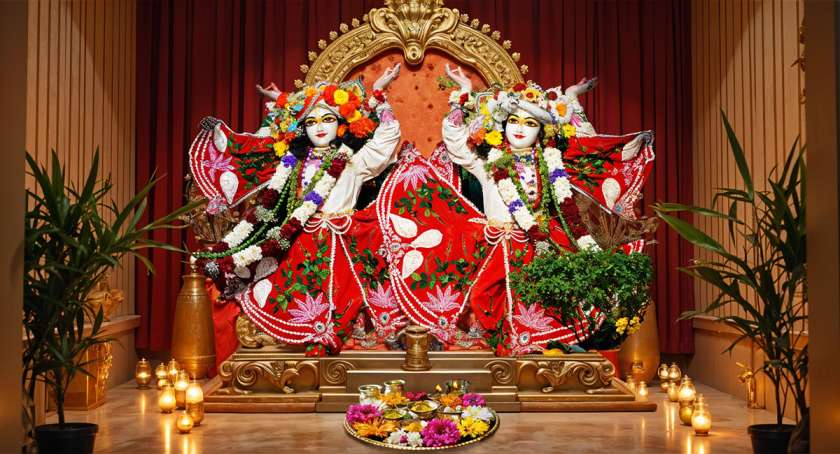Radha Ashtami: The Celebration of Radha’s Birth in Odisha
Radha Ashtami is one of the most significant Hindu festivals, commemorating the birth anniversary of Goddess Radha, the divine consort of Lord Krishna. Celebrated with great devotion, particularly in Odisha, this auspicious day falls on the eighth day of the bright fortnight in the Hindu month of Bhadrapada. While Krishna Janmashtami, marking the birth of Lord Krishna, is widely celebrated across India, Radha Ashtami is observed with deep spiritual fervor, focusing on pure devotion and the intimate bond between Radha and Krishna.
The Significance of Radha Ashtami
Devotees revere Goddess Radha as the embodiment of Bhakti (devotion) and the spiritual energy of Lord Krishna. She symbolizes unconditional love, selflessness, and complete surrender to the divine. According to Hindu scriptures, Radha is not just Krishna’s beloved but his eternal consort, representing the highest form of devotion. Vaishnavite traditions emphasize her role in divine pastimes, portraying her as an inseparable part of Krishna’s spiritual essence.
Despite being less known than Krishna Janmashtami, Radha Ashtami holds a unique place in the hearts of devotees. The festival encourages spiritual seekers to cultivate devotion, emphasizing that true love is selfless and transcends materialistic attachments.
Mythological Background
People believe that Radha incarnated as the daughter of King Vrishabhanu and Queen Kirti in the village of Barsana. Unlike ordinary births, some texts suggest that she manifested directly as a divine entity, signifying her eternal nature. Ancient scriptures like the Bhagavata Purana and Brahma Vaivarta Purana describe her as Krishna’s divine counterpart, existing beyond time and space.
Although Vrindavan remains the principal pilgrimage site for Radha devotees, Odisha, with its rich Vaishnavite heritage, also reveres her with deep devotion. The state’s spiritual culture is intertwined with the Radha-Krishna tradition, making Radha Ashtami a grand celebration in many temples and sacred sites.
How Odisha Celebrates Radha Ashtami?
Odisha observes Radha Ashtami with a blend of ritualistic devotion and cultural festivities. Temples dedicated to Radha-Krishna witness grand celebrations, with devotees engaging in various religious activities, bhajans, and processions. They mark the festival with special pujas, fasting, abhisheka (ceremonial bathing), and devotional singing.
Celebrations at Prominent Temples:
- Jagannath Temple, Puri: One of the most significant Radha Ashtami celebrations in Odisha occurs at the Jagannath Temple in Puri. Though primarily dedicated to Lord Jagannath (a form of Krishna), the temple also reveres Radha with special rituals. Devotees gather to witness the divine offerings and discuss Radha’s devotion to Krishna.
- Sakhi Gopal Temple: Located near Puri, the Sakhi Gopal Temple holds immense significance in Radha-Krishna worship. Legend states that the temple houses a sacred idol of Krishna that was once miraculously brought to life by Radha’s devotion. On Radha Ashtami, devotees participate in grand festivities, including a ceremonial abhisheka of the deities, followed by vibrant bhajans and kirtans.
- Radha-Krishna Temples Across Odisha: Several other Radha-Krishna temples across Odisha, including those in Bhubaneswar, Cuttack, and other significant towns, host special celebrations. These temples arrange kirtan sessions, cultural programs, and elaborate idol decorations.
Rituals and Customs of Radha Ashtami
- Fasting and Devotional Offerings: On Radha Ashtami, devotees observe a strict fast, which is broken only after offering prayers to Radha and Krishna. The fast signifies spiritual purification and deepens the devotee’s connection with the divine. Special prasad, including traditional sweet dishes like kheer, laddus, and fruits, is prepared and distributed among worshippers.
- Abhisheka and Alankara (Decoration of Deities): The deities of Radha and Krishna undergo an elaborate abhisheka (ceremonial bathing) with panchamrita, a mixture of milk, honey, yogurt, ghee, and water. Afterward, they adorn the idols with beautiful clothes, jewelry, and fragrant flowers, particularly lotus and roses, which symbolize purity and devotion.
- Bhajans and Kirtans: Devotional singing is integral to Radha Ashtami celebrations. Groups of devotees sing melodious bhajans and kirtans, recounting the divine love and pastimes of Radha and Krishna. The rhythmic beats of mridangams and cymbals create a spiritually uplifting atmosphere in the temples.
- Recitation of Scriptures: Devotees chant passages from holy books such as the Bhagavad Gita, Srimad Bhagavatam, and other Vaishnavite writings to honor Radha’s devotion. The readings emphasize her role as the supreme devotee and the ultimate embodiment of Bhakti Yoga.
The Spiritual Essence of Radha Ashtami
While the external festivities add grandeur to the occasion, Radha Ashtami carries a more profound spiritual message. It teaches devotees the importance of love, surrender, and unwavering devotion to God. Worshiping Radha grants divine grace, as she represents the highest form of Bhakti.
Lessons from Radha’s Devotion:
- Unconditional Love: Beyond worldly expectations and wants, Radha’s love for Krishna is an excellent example of selfless devotion.
- Surrender to the Divine: Her unwavering faith in Krishna teaches the essence of complete surrender to God.
- Path of Bhakti: Radha’s devotion highlights Bhakti Yoga, the route of love and devotion to achieve spiritual enlightenment.
Final Thoughts
Radha Ashtami in Odisha is a profoundly spiritual and culturally enriching festival that reflects people’s profound devotion to Radha and Krishna. Whether through temple rituals, fasting, bhajans, or cultural performances, the celebration strengthens the divine connection between devotees and the supreme couple. For spiritual seekers, participating in Radha Ashtami festivities in Odisha offers a soul-stirring experience. As devotees chant Radha’s name with reverence, the festival inspires millions, reminding them of the power of love, devotion, and surrender in the journey toward divinity.


